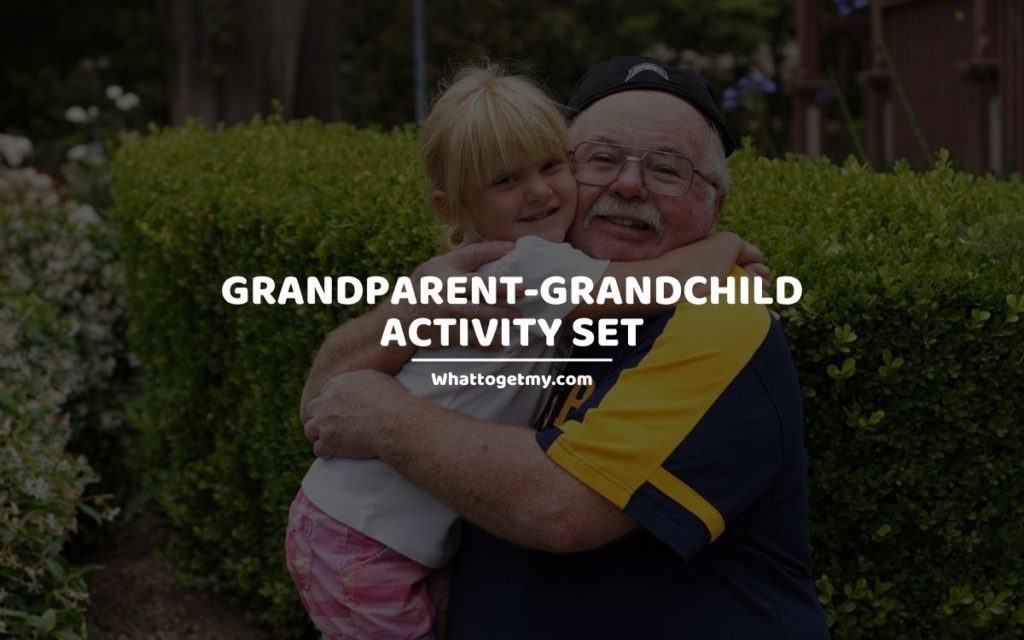17 Cognitive Development Activities for 6-12 Years Olds
WhatToGetMy Instructional Article
Middle childhood is an important time in a child’s life where foundational skills are developed. It is equally a good time to engage children with remedial activities that will help them to improve in areas they are lagging behind.
- What describes the cognitive abilities of 6-12 year old children?
- Cognitive development activities for middle childhood
WHAT DESCRIBES THE COGNITIVE ABILITIES OF 6-12 YEAR OLD CHILDREN?
The cognitive development of middle childhood is often characterized by; improved attention, complex thought processes, improved vocabulary, better communication skills, self-awareness, and emerging social reasoning skills.
This means that children in this age bracket should be able to;
- Concentrate or focus on tasks for a longer period of time
- Memorize and retain information for an extended period of time
- Process information faster, flexibly, and more accurately
- Apply logic to their thought process which shows up in their classification of things
- Develop independent reading skills
- Develop interest in various activities (hobbies)
- Communicate better and express themselves with a wide range of words
- Empathize or weigh things from other people’s perceptive
- Assess their ability through comparison
These skills are usually evaluated in school by teachers and educators through various class exercises, tests, and observations, and school activities, the results are then communicated to parents. It is quite common to see parents panic when they notice their children are lagging behind and it’s understandable. While cognitive assessments provide useful information about a child’s learning progress, the information is sometimes mishandled and this could have adverse consequences for the child.
A child’s cognitive development is a function of multiple factors and therefore can be improved by a lot of helpful activities.
COGNITIVE DEVELOPMENT ACTIVITIES FOR MIDDLE CHILDHOOD
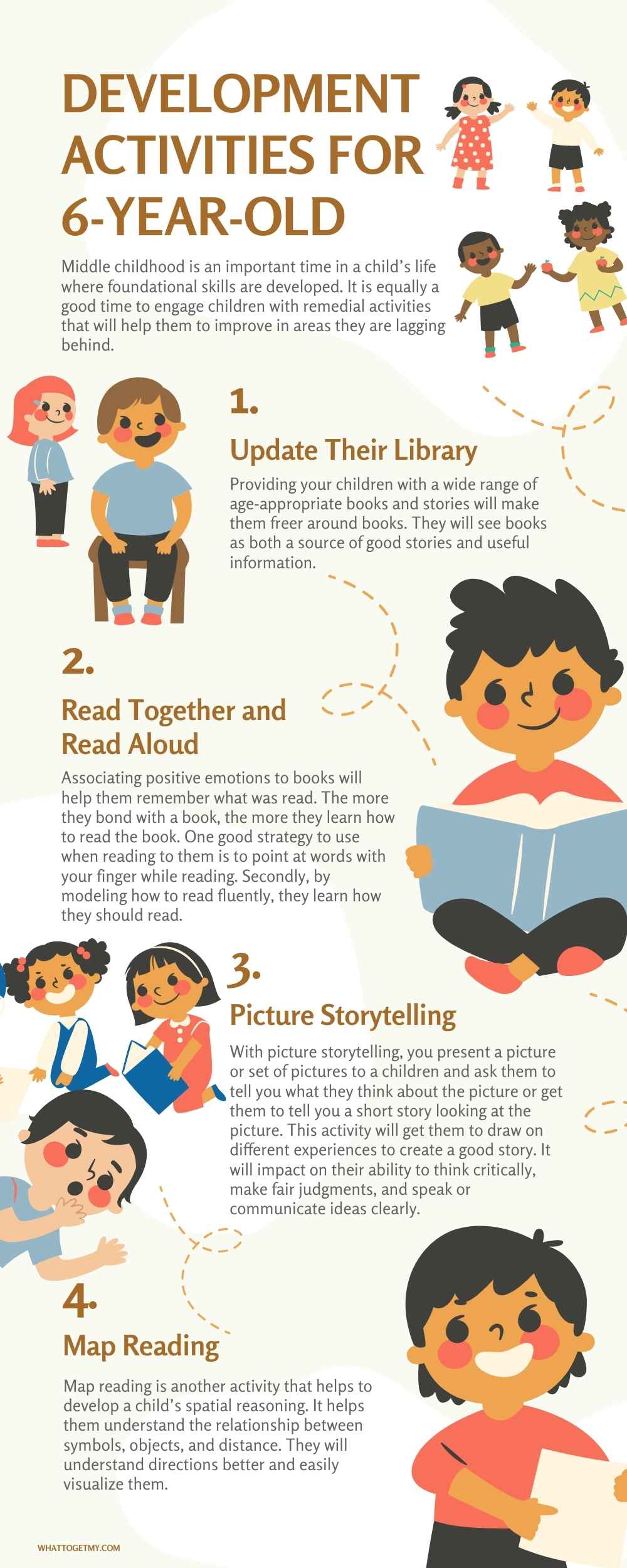
Source Link: https://whattogetmy.com/cognitive-development-activities-for-6-12-years-olds/
There are a couple of activities that could boost a child’s cognitive development and help them perform better in areas they are lagging behind. With consistent practice and patience, a child’s achievement deficit can be narrowed and surpassed. You can find more mentally stimulating activities for children in our article 12 super fun activities for 12 year olds
READING ACTIVITIES:
Good reading skill improves a child’s ability to communicate, attention span, and sense of judgment. It is expected that at the age of 6 and 7, children should be able to recognize words and read them out. They should also be inquisitive about new words as it expands their vocabulary. If a child is struggling with reading, there are a couple of things you could do to help them learn how to read.
A study that compared the reading times of students and their reading scores found that students who read 15 minutes or more a day experienced accelerated reading growth than children who read for a lesser amount of time.
Accelerated reading growth: Source: Renaissance
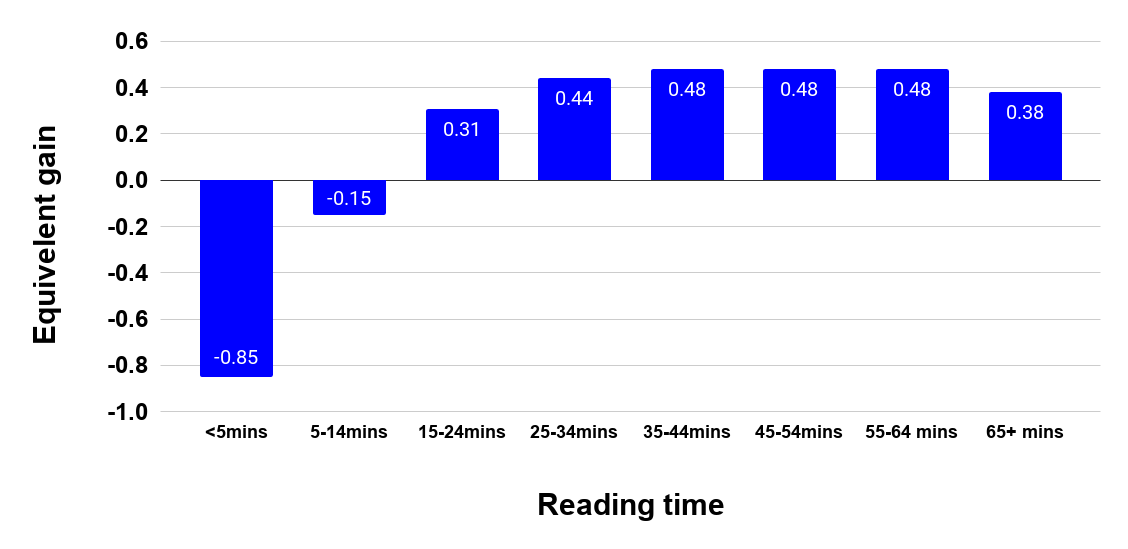
You can help a child cultivate a good daily reading habit by doing the following;
1. UPDATE THEIR LIBRARY OR TAKE THEM TO A LIBRARY:
While their textbooks and class notes are a good source of information, having them alone will make reading boring. They may begin to associate reading books with a negative feeling and will therefore find it difficult to read. Providing your children with a wide range of age-appropriate books and stories will make them freer around books. They will see books as both a source of good stories and useful information. Examples of age-appropriate books you could get for them are; The true story of the three little pigs, A bear called Paddington, Sight words and spelling workbook, and Reading activities. If getting your child new books isn’t feasible, take them to a local library and spend time with them reading until they get used to doing it alone.
2. READ TOGETHER AND READ ALOUD TO THEM:
Children love to be read to especially when it is done in a fun way like mimicking characters. It helps them to associate positive emotions with the content of the book. Associating positive emotions to books will help them remember what was read. The more they bond with a book, the more they learn how to read the book. One good strategy to use when reading to them is to point at words with your finger while reading. Secondly, by modeling how to read fluently, they learn how they should read. With patience and consistency, they will learn how words are pronounced, their meaning, and when to use them in a sentence.
3. GET THEM TO READ ALOUD
While reading to them is great, have them read to you. You can start by making them read two sentences from their favorite storybook, then a paragraph, page, and chapter until they are able to read the entire storybook to you. Ensure to start with a book they are familiar with, a book you’ve read to them a couple of times. Celebrate their progress and continue to encourage them. This will boost their self-esteem and confidence to do better.
4. WATCH PHONICS VIDEOS
Phonics is a simplified way of learning English. Phonics videos are not only instructive but also engaging and entertaining which makes them an effective method of teaching children how to read. Children can learn the sounds that alphabets make individually and when paired with each other. You can find lots of amazing phonic videos online for your child.
5. PLAY WORD GAMES
Play games that require them to form words they know and as well learn new words from their opponent. With games such as scrabbles, Word Witt, Jabuka word game, and Search puzzle, you are able to access their word game and teach them new words and their meaning. With time, their vocabulary will expand.
COMMUNICATION ACTIVITIES:
A child’s ability to communicate orally and in written form weighs on their academic achievement, social skills, and their ability to succeed in life. In a study, adults were asked which skill they thought children needed the most to succeed and communication skill was ranked higher than other skills.
Skills that are most important for children to succeed: Source: Pew Research Center
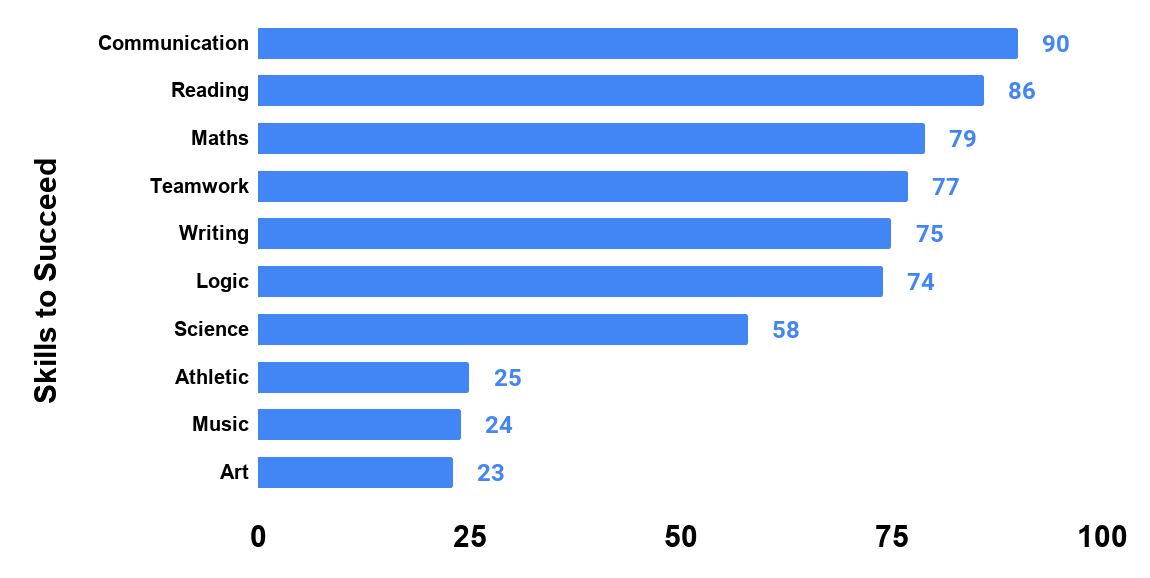
At the age of 6-9, a child cannot depend so much on their body language to communicate their ideas and emotions. It is expected that children within this age bracket should be able to make coherent and lengthy sentences using the right grammar and voice tone. They should also be able to write down ideas clearly. This helps teachers access their level of knowledge and helps children to speak up for themselves in any setting.
For communication to be effective, it should involve
- Listening
- Keeping an open-mind
- Asking questions / seeking opinions
- Eye contact
- Expressing one’s point clearly
Here are a couple of activities that should help a child improve their communication skills
6. ROLE PLAY
In role-play, you try to mirror possible life scenarios and get them to respond as they should in such scenarios. Doing this helps children to think and prepare themselves to respond better ahead of time. An example could be; getting them to introduce themselves in class or to a group. You start by mirroring how they should introduce themselves and then get them to introduce themself. You could make it more practical for them by inviting a friend over and informing your child that a family friend will be visiting them soon and that they would be required to introduce themself. This will make the experience real and will also help to boost their confidence to speak up in other social settings.
7. PICTURE STORYTELLING
With picture storytelling, you present a picture or set of pictures to a child/ren and ask them to tell you what they think about the picture or get them to tell you a short story looking at the picture. This activity will get them to draw on different experiences to create a good story. It will impact on their ability to think critically, make fair judgments, and speak clearly/communicate ideas clearly.
8. TELEPHONE PLAY
Telephone play is a great fun activity for children. Teachers can incorporate this into their class activity. It teaches children how to listen attentively. In telephone play, get children to sit in a circle and whisper a message to a child ear, who then passes it on to the next person, and next person to the next until the message reaches where it started. You can then ask every child to say what they heard in unison or individually. Their responses will most likely differ and it’s ok if everyone laughs about it. However, do not forget to let them know the goal of the activity. You can make the game a little bit serious in the second round by including stricter rules. This is to make them more eager to listen attentively.
9. IDENTIFY THE OBJECT
In this activity, a child is blindfolded and given a number of objects to describe. The child may ask for cues to help them accomplish the task. This activity is expected to help them think critically, be attentive to details, learn to ask questions, work with others, and communicate clearly. This task can be given in various settings with different rules. For example, you could take children to the zoo to learn about animals and after the trip, you can ask them to describe one animal they liked in the zoo and why they preferred the animal. This can be done as an individual task or group task. This activity will help their memory and giving them the opportunity to present this task will improve their oral skills.
10. GET THEM TO WRITE/JOURNAL
Get a book and get them to write a paragraph or two on various topics. For example, you can get them to write three things about their favorite room, describe their maths teacher or any subject teacher in four sentences. It is important to give them detailed instructions that will help them complete the task effectively. This activity can be done 2-3 times a week.
VISUAL SPATIAL/ PROBLEM SOLVING ACTIVITIES:
Children from ages 7-12 are expected to understand coordination, organization, planning, numerical, and categorizations. All these weigh on their visual-spatial process.
A child’s spatial thinking skills can positively impact on their ability to understand Science, Technology, Engineering, and Mathematics (STEM) as well as perform complex tasks. It involves understanding objects, their movement, and relationship with each other. With visual-spatial thinking, a child should be able to imagine objects or items and mentally fit them in positions and space or solve problems with them.
There are a couple of activities that can help a child’s visual-spatial thinking.
11. GAMES
There are a couple of games you should consider getting for your children. These games will require them to build unfamiliar structures and solve puzzles. They will be expected to figure which piece goes with which and as they are able to solve the task, give them a more complex task to solve. By so doing, they learn patterns, coordination, and organization. It will be great to build along with them until they are familiar with solving puzzles themselves.
- Building blocks
- Brain freeze
- Robot toy building set
- Gravity Maze Marble
- Tangrams puzzles
- Mosaic puzzles
- Jigsaw puzzles
12. CRAFT ACTIVITIES
13. MAP READING
Map reading is another activity that helps to develop a child’s spatial reasoning. It helps them understand the relationship between symbols, objects, and distance. They will understand directions better and easily visualize them. You can start with simple maps and then graduate to teaching them a more complex map.
14. ASSIGN HOMES TASK/CHORES TO THEM
They can improve their ability to organize, coordinate, and categorize by doing chores. You could assign them the task of organizing their room. You could also call them to join you in cooking or baking and teach them how to measure ingredients.
MEMORY ACTIVITIES
Cognitive development of 6-12 years is characterized by their ability to memorize and recall information when needed. A lot of scholarly work suggests a strong link between a good memory and academic achievements. Children that are able to effectively store information in their memory and recall them when needed tend to perform better in school. If your child is struggling in this area, there are a couple of things you could do to help improve on their ability to retain and recall information.
15. ASK QUESTIONS
Ask them questions that require them to think and remember. For example, you could ask them to remind you why their favorite character in a storybook was annoyed or unhappy, who lives at the end of the street, what color was gotten when you both mixed the colors red and white. It is important to ask them about things or topics they have been taught. In a situation where they are struggling to remember, be patient, give them time to think, give them cues, and if they are still unable to remember, remind them. Repeat the question a couple of times more and do it randomly. With repetition and practice, they will be able to remember.
16. SIMPLIFY TASKS
Some children find it difficult to grasp what they are being taught because they feel bombarded with so much information at a go. While it may be difficult for teachers to consistently teach at a very slow pace, parents can help their children to learn and remember what they have been taught by breaking lessons or tasks into smaller bits. For example, when learning fractions, you can start by helping them identify numerators and denominators following by showing them how to identify smaller fractions and bigger fractions. It is important to use simple language and familiar items as references while teaching. You could use biscuits or cups of water to teach fractions.
17. PLAY GAMES THAT REQUIRE THEM TO REMEMBER RULES
Card games are good for memory. Children are expected to know the rules of card games and the meaning of each card to play the game well. There are equally board games that could improve their working memory. You can find a few useful board games in our articles fun games to play with 2 people and games to play with 6 people.
FREQUENTLY ASKED QUESTION
1. What are some cognitive development activities for school-age kids?
We’ve mentioned 17 cognitive activities for school-age kids and some of are, reading aloud to children and encouraging them to equally read aloud to you. This activity will expose them to new words, help them memorize familiar words, improve their ability to read and their grammar. You could also get them to watch fun phonic videos that help them learn the sounds of alphabets and how to pronounce unfamiliar words using the sounds of its letters.
2. Name some classroom cognitive development activities
- Telephone play: it teaches them how to be good listeners
- Identify the object: it teaches them to be attentive to details, it improves their social skills and communication skills
CONCLUSION
In this article, we’ve identified some cognitive milestones that children between the ages of 6-12 are expected to attain. In situations where a child is not making enough progress, there are a lot of cognitive development activities for middle childhood learners that will help them improve their cognitive performance. We have listed 17 and there are many more. We hope that this article has been helpful in understanding how to improve a child’s reading ability, communication skills, visual-spatial ability, and memory skills.
01 HOURS 29 MINUTES
ESTIMATED TIME DESIGNING AND UPLOADING THIS ARTICLE
15 HOURS 22 MINUTES
ESTIMATED TIME RESEARCHING AND WRITING THIS ARTICLE
You Might Also Like

How to Teach Your Child to Give Back
How to Teach Your Child to Give Back WhatToGetMy Instructional Article These days, parents talk a lot about teaching children to give back. There was a time when generosity and kindness were merely considered as traits that children should learn about. Math, science, and sports,
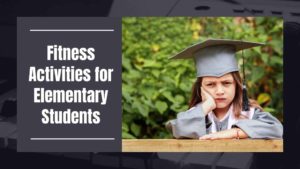
Fitness Activities for Elementary Students
Top Fitness Activities For Elementary Students WhatToGetMy Instructional Article Are you a parent that is looking for elementary fitness activities that they can do at home? Do you feel like your kids don’t do enough activities at school or you are looking for something to


